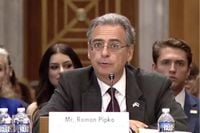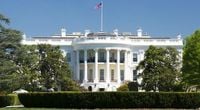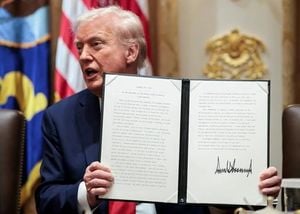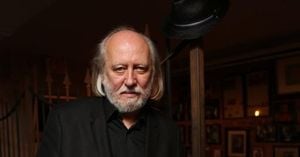In a flurry of diplomatic appointments that have captured attention at home and abroad, the United States Senate has confirmed a quartet of new ambassadors to key posts in Europe and the Caribbean, each representing a distinct blend of experience, background, and political context. The confirmations, which took place on October 8 and 9, 2025, reflect both the priorities of the current administration and the enduring complexities of U.S. foreign policy.
Perhaps the most headline-grabbing of these appointments is that of Herschel Walker, the former Georgia football legend and one-time Senate candidate, who will now serve as the American Ambassador to the Bahamas. Walker’s confirmation marks the first time in over a decade that the U.S. has sent a Senate-confirmed ambassador to Nassau, ending a lengthy vacancy. According to NBC and KYMA, Walker’s selection came as part of a single 51-47 vote that included more than 100 nominees, a vote that fell squarely along party lines and occurred in the midst of a government shutdown.
Walker’s path to the ambassadorship has been anything but conventional. A household name in Georgia sports, he was recruited by President Donald Trump to run as the Republican nominee in Georgia’s 2022 Senate race. Despite a high-profile campaign, Walker lost to incumbent Senator Raphael Warnock by a narrow 2.8-point margin in a runoff, as reported by WRDW/WAGT. Yet, his political ambitions did not end with that defeat. Trump, undeterred by Walker’s lack of formal diplomatic experience, nominated him for the Bahamas post last year. Supporters pointed to Walker’s name recognition and alignment with the administration’s foreign policy vision, while critics questioned whether his background prepared him for the challenges of diplomatic, trade, and security issues in the Caribbean.
During his Senate confirmation hearings, Walker pledged to prioritize engagement with the Bahamian government on immigration, climate resilience, and trade relations. As he told lawmakers, these issues would form the cornerstone of his tenure in Nassau. The confirmation was not without controversy: both of Georgia’s Democratic senators, Jon Ossoff and Raphael Warnock, voted against Walker’s nomination, reflecting broader partisan divides over the Trump administration’s choices for diplomatic posts.
Walker’s appointment is historic for another reason—he is the first U.S. ambassador to the Bahamas since 2011, a fact not lost on observers who have watched the relationship between Washington and Nassau evolve over the past decade. According to official statements, Walker will assume his duties in the coming months, representing American interests throughout the Bahamian archipelago.
Meanwhile, the Senate also confirmed Nicole McGraw as the new American Ambassador to Croatia. As reported by Hina, McGraw is a Florida resident whose career spans entrepreneurship, philanthropy, and cultural diplomacy. An art historian by training, she previously ran an internationally recognized art gallery and was among the earliest curators to exhibit Cuban art in the United States. Her passion for bridging cultural divides led her to found CANVAS Art Charities, a non-profit dedicated to revitalizing urban spaces, and to serve as CEO of NFT Group, where she integrated digital art with blockchain technology.
During her Senate confirmation hearing in April 2025, McGraw outlined four main priorities for her term in Zagreb: economic and cultural diplomacy, security cooperation, promoting American excellence, and protecting U.S. citizens abroad. The U.S. Embassy in Zagreb welcomed her confirmation with enthusiasm, sharing on social media, “Congratulations to Nicole McGraw on her confirmation by the US Senate as Ambassador to Croatia! We look forward to welcoming her to Zagreb and working under her leadership to advance US interests and deepen the strong ties between our two countries.” Her appointment is expected to strengthen collaboration between Croatia and the United States in culture, innovation, and defense.
In northern Europe, Roman Pipko, an Estonian-born U.S. lawyer, was confirmed as the next ambassador to Estonia. As reported by the U.S. Embassy in Tallinn, Pipko’s journey began in Estonia, where he was born in 1960 and lived until emigrating to the United States with his mother in 1981. President Trump nominated Pipko in January 2025, citing his extensive experience representing U.S. interests in the European Bank for Reconstruction and Development and the Russian American Enterprise Fund.
Pipko’s nomination drew praise from figures such as former world chess champion Garry Kasparov, who highlighted the ambassador’s anti-authoritarian family background. During his June 2025 Senate hearing, Pipko commended Estonia’s commitment to defense spending and its vocal support for NATO, noting, “Estonia not only committed its own resources to defense spending, but it has also been a clear voice within NATO in supporting the American call for increased spending. In fact, some people have called Estonia a megaphone for American requests.” With the security situation in Europe increasingly tense amid Russian demands, Pipko’s tenure is expected to focus on reinforcing the U.S.-Estonia alliance and supporting broader NATO objectives.
Finally, the Senate approved Joe Popolo as the new U.S. Ambassador to the Netherlands. Popolo, a 57-year-old Texas businessman and philanthropist, was nominated by President Trump in early January 2025. As reported by DutchNews.nl, Popolo is head of Charles and Potomac Capital and has a background in entertainment and philanthropy. His appointment has not gone unnoticed in political circles—he made an $800,000 donation to Trump’s election campaign last year and contributed $500,000 to a Republican fund. While such donations are legal, they have drawn scrutiny from some critics who question the role of political giving in ambassadorial appointments.
Popolo will formally assume his post after presenting his credentials to King Willem-Alexander, an event expected later this month. The U.S. Embassy in The Hague expressed anticipation, stating it looks forward to working with Popolo to strengthen the longstanding partnership with the Netherlands. Popolo succeeds Shefali Razdan Duggal, and his tenure will follow a period in which no U.S. ambassador to the Netherlands has completed a full four-year term since 2005.
These ambassadorial confirmations come at a time of heightened global uncertainty and shifting alliances. Each appointee brings a distinct skill set and personal narrative to their new role, reflecting both the diversity and the political realities of American diplomacy. Whether it’s Walker’s celebrity status, McGraw’s cultural entrepreneurship, Pipko’s transatlantic legal expertise, or Popolo’s business acumen, all four will face the challenge of representing U.S. interests abroad in a world where diplomacy is as much about building relationships as it is about advancing national agendas.
As these ambassadors prepare to take up their posts, the world will be watching—not just to see how they perform, but what their appointments say about America’s evolving approach to diplomacy in the twenty-first century.






